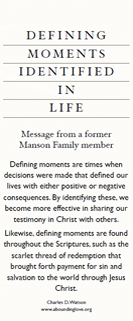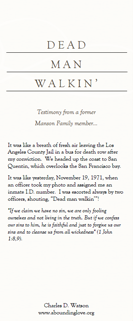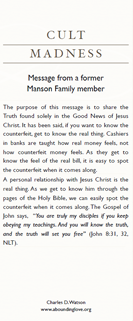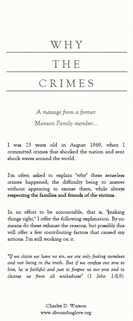It's easy to start a Christian 12-step group by enlisting committed Christians in your church or prison by placing an advertising sign-up sheet on the bulletin board with the place and time of the meeting.
Significant value can be gained if a recovering person who is familiar with the 12-steps acts as a group facilitator and has at least one co-facilitator. The facilitator’s role is to provide support, direction and encouragement to the participants.
It is important to realize that this is not group therapy where professional advice is given; it is an arena where individuals can share their own experiences, strength and hope.
Suggested Meeting Format
The idea is to complete a step each month, during a weekly two-hour meeting. The first weekly meeting each month will stay in the large group, but will break up into smaller groups the following weeks. For example, if twenty-four people participate, divide into four family groups with six members in each group.
The first week each month, the large group will start with the Serenity Prayer, the Twelve Steps and related scriptures, and the group participant guidelines in a large circle with each member participating one by one. Then, the facilitators will lead a group discussion using the aboundinglove.org Christian 12-Step Chart for the Step being worked, and at the end, close in prayer.
The following weeks that month will begin like the first week large group, but will break up into family groups after the group participant guide lines are read. The family group will be led by a facilitator and a co-facilitator, sitting in a circle discussing 6 to 8 questions a week from the abounding love.org Christian 12-Step Questions. The final 15 minutes of the meeting is devoted to a member from each family group sharing new insights back in the large group, and at the end, close in prayer, possibly in a large circle holding hands.
Facilitator guidelines
The facilitator serves as a resource in answering questions relative to working the materials. This individual offers an element of security for group members to turn to when problems arise. They may desire to rotate in the family groups to give the facilitator the opportunity to relate with all members and be attentive to everyone's needs.
A facilitator should be sensitive to those who experience stress or discomfort as a result of group participation. When people touch on painful experiences, especially for the first time, they may become emotional and begin to cry. The facilitator and other group members should be patient, accepting the sadness as a natural and appropriate part of the healing process.
The Twelve Step process is rooted in the belief that God is guiding the entire process and is the ultimate authority inherit and present in the group. Your role of facilitator enhances one's own recovery and serves as a model to the group to “carrying the message to others.”
Listen to what is said
Spoken messages contain three essential parts: words, tone of voice, and nonverbal cues or body language. Consider what the person is saying with the words and with nonverbal cues.
Establish group guidelines
Group guidelines create safety and encourage deeper sharing, and will vary according to the group needs. Establishment mutually agreed upon guidelines in advance, so participants know what to expect. Some basic fundamentals are:
- No probing
- No cross-talk, fixing or advice giving
- No judging
- No interrupting
- Model spiritual character
Group members will feel safe when the facilitator models spiritual virtues such as patience, kindness and love. Showing concern and sensitivity for others helps members grow in empathy for one another.
Reward honestly and openness with Affirmations
Affirm group members with praise, encouragement, appreciation and acknowledgement. Guard against mixed messages, such as “Jim, you add so much to this group by your presence, you just need to be here more often.” A brief affirmation such as “I am glad you're here Jim” or “Thanks for sharing” or “Good insight” is effective and supportive.
Use personal experiences as teaching tools
Encourage members to value and learn from the experiences, strength and hope shared by others in the group. Life’s most important lessons are best shared as stories.
Encourage appropriate trust and loyalty
Group loyalty and trust is a result of members feeling safe with one another. When the members feel safe, they become more open and honest. As the facilitator, describe your personal understanding of confidentiality within the group, explain the damage that gossip causes, and emphasize the benefits of maintaining privacy.
Focus on Harmony as a group priority
Without harmony, group members will not feel comfortable expressing their feelings. Encourage harmony while helping the members focus on their attitudes and conduct. Remind the group to treat others with dignity and respect, to promote acceptance and tolerance, and to seek unity even in conflict.
Relate to the Here and now
Sharing one's current story and experience promotes growth. War stories from the past and hopes for the future can either retard growth or encourage denial. But “telling it like it is” today encourages honesty.
Promote sharing on a feeling level
To share feelings is to communicate on a deeper level. Most people are comfortable repeating clichés, reporting facts, and sharing judgment. They are unwilling to include feelings as a part of their story, for fear of becoming vulnerable. Help participants to feel safe to share feelings by modeling this type of sharing and acknowledging those who do the same.
Confront in a loving way
Without confrontation, injuries, offenses, and differences can fester into destructive and decisive forces. It is important to confront potential problems promptly. If someone is giving advice during the meetings, give a gentle reminder that this is inappropriate. If the problem persists, talk to the person privately. Confrontation is appropriate when someone:
- Give unsolicited advice or gossip about others
- Dominates others and doesn't listen when others share
- Doesn't observe group guidelines
Have a plan for Conflict
Conflicts are a natural part of the small group process. The facilitator’s role is to help the group resolve the conflict among themselves. The following are guidelines for the group to follow in addressing conflict away from the members:
Check your attitude: When a problem arises, have the group members ask themselves, “what is my attitude towards this person and the situation?”
Define the problem: The problem that first arises is rarely the real issue. People affected by past feelings, hidden agendas, and many other situations. Group members should state the problem using the word “I”.
Report your feelings: The best way to get to the heart of the issue is to express feelings. Participants can more easily focus on feelings by using statements, such as, “I feel…when this happens,” rather than “You make me feel…”
State your request: Requests should focus on a change in behavior and not on another person's character. Requests should be as simple as possible such as “I would feel better if you came to the meeting on time,” rather than “I wish you weren’t so tardy.”
Negotiate and affirm: Conflict should be resolved in ways that benefit both parties and affirm everyone who makes an attempt to change. Requests should be made in such a way that there is always room for compromise.
Group participant guidelines
Recognize that the Holy Spirit is in charge. Gratefully acknowledge the Holy Spirit's presence and pray for His guidance and direction.
Make a point of ministering love in an appropriate manner. Respect the needs of others by asking permission to express concern with a hug or a touch. Many are uncomfortable with physical contact.
Focus individual sharing on the step being worked. Focus sharing an individual’s experience, strength and hope in working the steps being directed. Allow equal time for everyone in the group to share.
Limit talking and allow others to share. Keep your comments brief, take turns talking, and don't interrupt others. Report each person's right to self-express without comment.
Encourage comfort and support by sharing one's own experiences. Do not attempt to advise or rescue them. Accept what others say without comment, realizing it is true for them. Assume responsibility only for your own feelings, thoughts and actions.
Refrain from crosstalk. Crosstalk occurs when two or more people engage in dialogue that excludes others. It may also involve advice giving.
Maintain confidentiality. Keep whatever is shared within the group to ensure an atmosphere of safety and openness.
Avoid gossip. Share your own needs and refrain from talking about a person who is absent.
Refrain from criticizing or defending others. Lovingly hold others accountable for their behavior only if they ask you to do so. Otherwise, recognize that we are all accountable to Christ and it is not our place to defend or criticize others.
Come to each meeting prepared and with a prayerful attitude. Before each meeting, read designated materials and complete any written exercises. Pray for guidance and a willingness to share openly and honestly when you communicate with at least one other group participant.
Christian 12-Step Recovery Facilitator Worksheet for Small Groups
(Suggestions and guidelines from THE TWELVE STEPS, A Spiritual Journey Workbook) Copyright 2012 RPI Publishing, Inc. All rights reserved
Resources
ABOUNDING LOVE MINISTRIES Christian 12-Step Brochure, Charts and Questions
RPI PUBLISHING, INC. Pam Nielson PO Box 66398 Scotts Valley, CA 96067 (800) 873-8385 (THE TWELVE STEPS — “A Spiritual Journey, A Working Guide for Healing” workbook.)
CHRISTIAN 12-STEP MINISTRY PO Box 4321 Ocala, FL 34476-4321 (Correspondence Course & Parole Board letter.)
OVERCOMERS OUTREACH To locate the Christian 12-Step nearest you, go to: www.overcomersoutreach.org (A Directory for each State is available.)
IMPACT PUBLICATIONS Job, Re-Entry, and Recovery Solutions: www.impactpublications.com
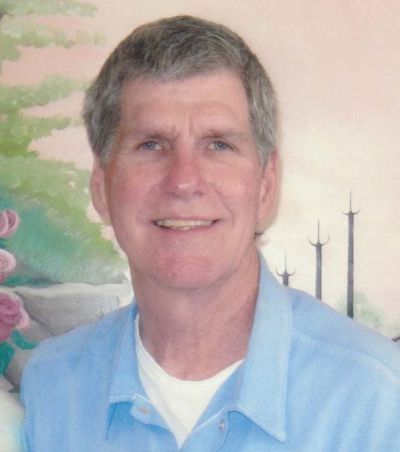
 Welcome! I answer everyone who writes by enclosing a letter, brochure and ministry card when you Contact Me. But first, please find answers to your questions by exploring the site to get to know the new me. My sole desire is to help you understand salvation through God's love and to put Jesus first in your life.
Welcome! I answer everyone who writes by enclosing a letter, brochure and ministry card when you Contact Me. But first, please find answers to your questions by exploring the site to get to know the new me. My sole desire is to help you understand salvation through God's love and to put Jesus first in your life.










